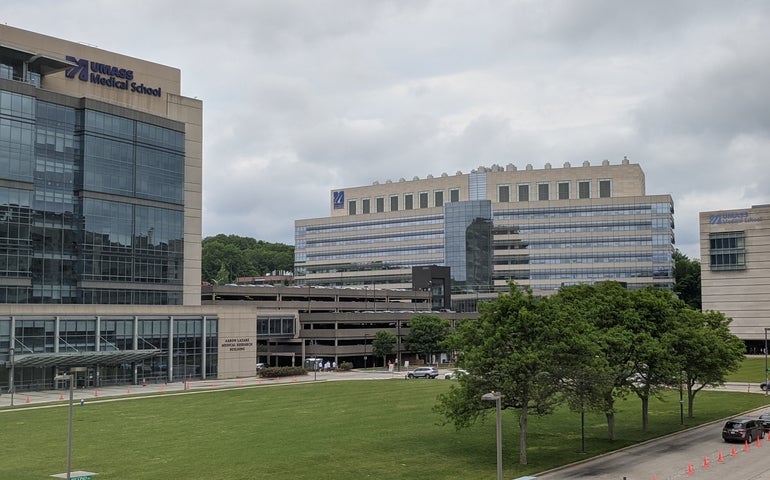The University of Massachusetts system, the third-largest employer in the state, will cut about 6 percent of its full-time equivalent workforce and furlough thousands as part of its efforts to close a $264 million budget gap ripped open by the COVID-19 pandemic.
Nearly three in 10 UMass employees will be affected by the cost-saving measures, and university officials will also scale back spending on supplies and capital projects.
At a virtual meeting Monday where the Board of Trustees approved a $3.3 billion fiscal 2021 budget that freezes tuition, President Marty Meehan warned that the four campuses and medical school must overcome an “unprecedented financial challenge.”
“We face difficult decisions today and we will continue to face them in the weeks and months ahead,” Meehan said. “We are coming at this problem from every possible direction.”
UMass officials cut workforce spending by about $163 million and non-personnel costs by $92 million to help balance the budget, according to a budget summary provided by a spokesperson.
The system has already laid off 134 of its nearly 24,000 workers and will terminate employment of another 397. About 1,125 student and temporary positions have also been cut, 790 open full-time equivalent jobs will not be filled, and more than 3,000 employees face furloughs this fiscal year, according to the summary.
About $243 million in planned long-term capital projects are on hold across the UMass system. Other savings will come from consolidating procurement for the multiple schools and continuing a years-long efficiency effort.
Planning for the upcoming year is made more challenging by uncertainty about federal legislative action and enormous budget strain on state government. In Massachusetts, officials project a revenue shortfall of $2 billion to $8 billion below earlier estimates, and state leaders have not fashioned a plan to deal with that.
Other questions linger about the number of students who will remain enrolled once their schools shift to mostly or entirely online classes. UMass campus officials anticipate a decline in enrollment of about 5 percent, but said Monday that number could change as the fall semester approaches.
The fiscal 2021 budget UMass trustees approved Monday, which is about $171 million less than fiscal year 2020’s spending levels, also responds to the outbreak by planning for additional precautions and aiming relief at students and their families.
Campuses will collectively spend about $30 million more on testing, personal protective equipment, physical distancing preparations, and other precautions against transmission of the highly infectious virus.
Meehan praised UMass for confronting the COVID crisis “better than many.”
With Monday’s vote, trustees gave their approval to a plan Meehan unveiled in May to freeze tuition for nearly 48,000 in-state undergraduates and 9,500 graduate students across the Amherst, Boston, Dartmouth and Lowell schools.
Officials had increased tuition annually to mirror inflation for the past several years, but it will remain at last year’s level for the 2020-2021 academic year. That change means UMass will forego about $18.6 million in revenue for the system next year.
“Freezing tuition is the right thing to do, but will put additional stress on our budgets,” Meehan said.
UMass anticipates its student population will receive almost $1 billion in financial aid from a combination of federal, state, private and university sources in fiscal year 2021.
The board approved both the fiscal 2021 budget and the tuition freeze unanimously, with trustees Stephen Karam and Julie Ramos Gagliardi abstaining from the student fees question.
UMass labor representatives flagged concerns with the plans during Monday’s call, urging campus leaders to embrace more defined plans for providing personal protective equipment and cleaning and to seek alternate ways to balance the budget rather than imposing cuts.
Anneta Argyres, who directs UMass Boston’s Labor Extension Program and is the president of the Professional Staff Union for the Boston and Amherst campuses, told the board her 2,000-member union is “very concerned” about the positions that will be lost, arguing that online learning requires more teaching and support staff than in-person instruction.
“This is not the time to eliminate jobs in public higher education, but jobs are being eliminated across our campuses,” Argyres said. “The reason we’re being given is you are requiring balanced budgets without the use of reserves. Why? What are you trying to protect? Our system has reserves that should be used to stabilize our campuses during crises, and we all know we’re in the midst of two crises right now: COVID and the economic collapse.”
“This is the time to use those funds to ensure that our institutions weather that storm,” Argyres continued.
Asked about potential use of reserves as Argyres suggested, a Meehan spokesperson replied, “We believe this will be a multi-year challenge we’re facing, and we want to be as flexible as possible.” The spokesperson did not indicate how much the system has in reserves.
Budget-writers anticipate $15 million in additional revenue, including $9 million from the federal CARES Act, but did not include in their plan any additional federal relief that may arrive after congressional talks.
Meehan, a former congressman, said he is working with other university presidents and with members of Congress to push for additional action. He said the so-called HEROES Act, a $3 trillion package the U.S. House approved in May, could bring $119 million in for the UMass system.
Rather than a system-wide approach, officials at each of the undergraduate campuses in Amherst, Boston, Dartmouth and Lowell are planning their own models for the fall with varying degrees of in-person instruction.
At Amherst, all students who return to campus will be asked to sign an agreement on “responsible behavior” to maintain public health, such as wearing face coverings in public spaces and keeping shared areas clean.
“They’re all required to sign an agreement and we’ll have a huge amount of educational and reinforcement opportunities,” Chancellor Kumble Subbaswamy said at Monday’s meeting.

